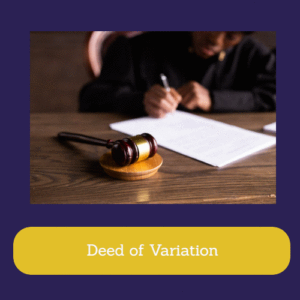 It’s good practice for a will to name more than one executor. Unfortunately, this theoretically creates the possibility for disagreement between them. So, can a co-executor act alone in the UK?
It’s good practice for a will to name more than one executor. Unfortunately, this theoretically creates the possibility for disagreement between them. So, can a co-executor act alone in the UK?
This rather depends on how the will is set up. Let’s take a look at the details:
Who are usually executors of a will?
There are usually two broad categories of people chosen as the executors of a will:
- Close friends or family members – trusted by the deceased to handle the many responsibilities of being an executor.
- A professional or business – providing executor services.
Both have their advantages and disadvantages. For example, a professional is likely to deliver a much better service and protects the deceased’s family from stress and disagreement. However, they will want to be paid for their time.
To be connected to a specialist solicitor near to where you live or work, please either call us now on 0845 1391399 or complete a Free Online Enquiry.
An executor’s responsibilities are many and varied, encompassing a wide range of paperwork, financial calculations, and legal obligations. They include but are not limited to:
- Registering the death (though this is sometimes handled by family members)
- Valuing the estate (sometimes requiring the hiring of surveyors or valuers)
- Calculating and paying Inheritance Tax
- Applying for probate (the legal permission to deal with the deceased’s estate)
- Notifying potential creditors of the death, paying debts, generally administering the estate and concluding the deceased’s affairs
Can a co-executor act alone?
It is common for multiple executors to be named in a will. This is to ensure that the wishes in the will can still be carried out even if something were to happen to one of the executors.
However, this does raise the possibility of a co-executor acting alone. Whether this can happen largely depends on how the will states certain decisions will be made. This can be:
- Jointly – decisions made jointly require the agreement of all executors.
- Jointly and severally – executors must act together (jointly) for some decisions but can act on their own (severally) for others.
It is important to note that if a type of decision or task is stated in the will to be a matter the executors should handle jointly, no one executor can make the decision on their own.
If the decision can be made severally though, any executor can make it. It also then counts as being the act of all the executors. The law does not distinguish. The only exception is if the matter concerns land.
Why might executors disagree?
Each executor should make sure that communication remains open and honest between themselves to make sure there are no disagreements. However, it’s not unheard of for executors to disagree because of:
- Historical personal disagreements
- Different methods or habits of individual executors
- Too much discretion or a lack of clarity in the executor’s role
Of course, it’s also possible that another executor may be discharging their duties poorly, unwilling to discharge them, or find their own interests in conflict with the will (perhaps because they live in a property that the will requires them to sell, for example).
What are the consequences of a co-executor acting alone?
There are several consequences of a co-executor acting alone. Usually, their co-executors respond by:
- Asking to negotiate – most disputes between executors can be solved with negotiation. This can happen simply between the parties, though independent third-party mediators can also be brought in.
- Requesting legal advice – a slight escalation involves seeking legal advice from an expert regarding the limits of an executor’s role.
- One executor stands aside – any executor can renounce their role at any time if they wish to (though it is smart to take legal advice before you do). You can also get a Notice of Power Reserved, meaning you are stepping out for now but reserve the right to come back later.
- Applying to the High Court for guidance – after expert legal advice, the next escalation is asking the High Court to step in. The court will not always do this, but can if the decision in question is deemed important enough.
- Removing one of the executors – this final rather extreme step is a possible consequence of an executor acting alone. This is only possible if gross incompetence or deliberate misconduct can be demonstrated rather than the situation being a clash of personalities.
The acrimony and general escalation of disagreements between the executors of a will can become hugely problematic and unpleasant if it proceeds beyond the amicable negotiation stage.
It is possible for a co-executor to act alone if the will states the decision can be made “severally”. But all of the above means it is best practice for multiple executors to actively communicate with one another to make sure disagreements don’t happen and no one acts alone.
Need specific advice about acting alone as a co-executor?
Let’s talk. Solicitors Near Me will find you the ideal friendly and approachable legal specialist to talk to – with zero cost or commitment.
Probate Solicitors Near Me
To be connected to a specialist probate solicitor near to where you live or work, please either call us now on 0845 1391399 or complete a Free Online Enquiry.

 The executor of a will is one of the most important roles in it. It comes with a large degree of responsibility and can involve a lot of work and many challenges. But does the executor of a will get paid in the UK?
The executor of a will is one of the most important roles in it. It comes with a large degree of responsibility and can involve a lot of work and many challenges. But does the executor of a will get paid in the UK? Expert Deed Of Variation Solicitors
Expert Deed Of Variation Solicitors Care home fees can be much higher than many people expect. Understandably, this means there is often a desire to minimise those costs. The way owning property as tenants in common and care home fees works can be a very beneficial interaction to understand.
Care home fees can be much higher than many people expect. Understandably, this means there is often a desire to minimise those costs. The way owning property as tenants in common and care home fees works can be a very beneficial interaction to understand. jointly own property in the UK. As joint tenants and as tenants in common. But what does tenants in common mean in a will?
jointly own property in the UK. As joint tenants and as tenants in common. But what does tenants in common mean in a will?